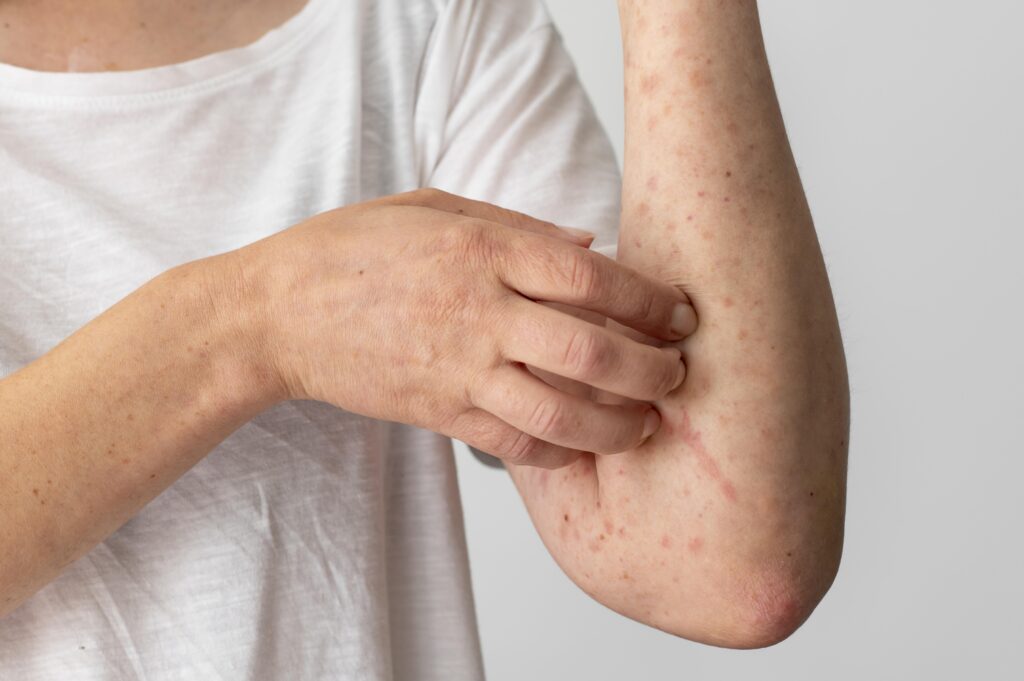- drambalkar@yahoo.co.in
- Mon - Sunday 10:00 AM - 02:00 PM
How To Heal Psoriasis Scars?
Psoriasis, the chronic skin condition characterized by red, scaly patches, can leave behind more than just physical discomfort. Sometimes, the condition can leave behind scars, impacting both your physical appearance and emotional well-being. For those living with psoriasis, the aftermath of flare-ups may leave behind scars that serve as a reminder of the condition’s impact on the skin. If you’re wondering how to heal psoriasis scars? this comprehensive guide offers insights into effective strategies to promote skin healing and minimize scarring.

Understanding Psoriasis Scars
Psoriasis scars are different from typical scars. They’re often flat, discolored patches that can be lighter or darker than your surrounding skin. They can also have a rough texture or appear pitted. These scars form as the body repairs inflamed or damaged skin. The severity of scarring varies among individuals, with some experiencing mild discoloration and others dealing with more pronounced scars
The good news is that psoriasis scars, unlike many other types, have a higher chance of fading and improving over time. Some disappear completely, while others may become less noticeable. With the right approach, you can get rid of psoriasis scars, significantly enhance their appearance and regain your confidence.
How To Heal Psoriasis Scars?
1. Gentle Skincare Routine
Maintaining a gentle skincare routine is paramount for individuals dealing with psoriasis scars. Psoriasis-prone skin is often sensitive, and harsh products can exacerbate irritation. Opt for fragrance-free and hypoallergenic skincare products to minimize the risk of adverse reactions. Choose a mild cleanser that effectively removes impurities without stripping the skin’s natural oils. When selecting a moisturizer, prioritize those with ingredients like ceramides and hyaluronic acid to hydrate the skin deeply. Consistency is key, so adhere to your skincare routine diligently to foster a soothing and nurturing environment for your skin.
2. Topical Treatments
Topical treatments play a crucial role in healing psoriasis scars effectively. Consult with a dermatologist to explore prescription options tailored to your specific needs. Corticosteroids are commonly prescribed to reduce inflammation and alleviate discomfort associated with psoriasis scars. Additionally, vitamin D analogs may be recommended to support the skin’s natural regeneration processes. These treatments work at the cellular level, aiming to minimize scarring and encourage healthy skin growth. Adhere strictly to your dermatologist’s guidance regarding the application frequency and duration of these treatments.
3. Natural Remedies
Natural remedies can complement traditional treatments, providing additional relief and nourishment for psoriasis-prone skin. Aloe vera, renowned for its anti-inflammatory and cooling properties, can be applied topically to soothe irritated skin and promote healing. Choose a high-quality, pure aloe vera gel or, better yet, extract the gel from a fresh aloe vera leaf for optimal benefits. Coconut oil, rich in moisturizing fatty acids, can help alleviate dryness and reduce the appearance of scars. Tea tree oil, with its antibacterial and antifungal properties, is another natural option to consider. Dilute it with a carrier oil and apply sparingly to areas affected by psoriasis scars for added moisturization and potential antimicrobial benefits. Always perform a patch test before using any natural remedy to ensure compatibility with your skin.
4. Avoiding Scratching or Picking
Psoriasis lesions can be intensely itchy, and the temptation to scratch or pick at them can be strong. However, this habit can have detrimental effects on the skin. Scratching exacerbates inflammation, leading to further damage and increasing the likelihood of scarring. To counter this, it’s crucial to resist the urge to scratch. Keeping nails short is a practical step to minimize the potential harm caused by scratching. Additionally, consider wearing gloves at night to prevent subconscious scratching during sleep, providing an extra layer of protection for your skin.
5. Phototherapy
Phototherapy, also known as light therapy, is a medically supervised treatment involving the controlled exposure of the skin to ultraviolet (UV) light. This therapeutic approach has proven effective in managing psoriasis symptoms by slowing down skin cell turnover and reducing inflammation. Phototherapy is administered by healthcare professionals in specialized settings, ensuring proper dosage and monitoring. Beyond managing active psoriasis, phototherapy has shown promise in scar reduction. The controlled exposure to UV light can promote skin healing and contribute to a more even skin tone over time.
6. Microneedling
Microneedling has emerged as a popular cosmetic procedure with potential benefits for improving skin texture, including reducing the appearance of scars caused by conditions like psoriasis. This technique involves the use of tiny needles to create controlled micro-injuries in the skin’s surface. The process stimulates the natural production of collagen, a protein vital for skin elasticity and regeneration. In the context of psoriasis scars, microneedling may help to break down scar tissue, encourage the growth of new skin cells, and promote a smoother skin texture. While the procedure should be performed by a qualified professional, it has shown promise in addressing various types of scars, offering a non-invasive option for those seeking scar reduction.
7. Dermabrasion and Laser Therapy
Dermabrasion: Dermabrasion is a dermatological procedure that involves the mechanical removal of the outer layer of skin using a specialized instrument. In the context of psoriasis scars, dermabrasion can target specific areas affected by scarring, smoothing the skin’s surface. The procedure helps to minimize the appearance of scars by promoting the growth of new, healthier skin cells. Dermabrasion is typically performed under local anesthesia, and recovery time varies based on the extent of the treatment.
Laser Therapy: Laser therapy for psoriasis scars employs targeted laser beams to precisely remove damaged or scarred skin layers. This controlled approach allows dermatologists to address specific areas without affecting surrounding healthy tissue. Laser therapy stimulates collagen production, promoting skin regeneration and a more even skin tone. Various laser technologies may be used, and the choice depends on the type and severity of the psoriasis scars. Laser therapy is often conducted in multiple sessions, and downtime varies depending on the intensity of the treatment.
Both dermabrasion and laser therapy are considered more aggressive interventions, typically reserved for cases where other treatments have shown limited effectiveness. Consultation with a dermatologist is essential to determine the suitability of these procedures based on individual skin conditions and scar severity.
8. Hydration and Nutrition
Hydration: Adequate hydration is fundamental for overall skin health, including the management of psoriasis scars. Water helps maintain skin elasticity and facilitates the body’s natural healing processes. Drinking plenty of water can also prevent skin dryness, which is especially crucial for individuals with psoriasis, as dry skin can exacerbate symptoms. Aim for at least eight glasses of water a day and consider using moisturizers to lock in hydration.
Nutrition: A well-balanced diet plays a crucial role in supporting skin regeneration. Focus on foods rich in vitamins and nutrients, especially those known to benefit the skin. Vitamins A, C, and E, as well as zinc, are particularly important. Consider incorporating fruits like berries, citrus fruits, and vegetables such as leafy greens into your diet. These foods are high in antioxidants, which can help combat oxidative stress and promote a healthier skin environment.
Ensuring proper hydration and nutrition provides a foundation for the body to heal and regenerate skin cells. However, it’s important to note that while these practices contribute to overall skin health, they may not directly target psoriasis scars. For specific scar treatment, consult with a healthcare professional to explore additional interventions tailored to your individual needs.
Conclusion
Healing psoriasis scars requires a multifaceted approach that combines gentle skincare practices, targeted psoriasis scar treatments, and lifestyle adjustments. It’s essential to consult with a dermatologist to develop a personalized plan that addresses your specific needs and skin condition. With patience and consistent care, you can promote the healing of psoriasis scars and embrace healthier, revitalized skin.
FAQs
Q1. How long does it take for psoriasis scars to fade?
While some scars vanish rapidly, others can take months or even years to fade significantly. It depends on individual healing, scar severity, and treatment approach. Consistent care and managing your psoriasis can speed things up.
Q2. Are there over-the-counter options for healing psoriasis scars?
Absolutely! Look for psoriasis marks removal cream or ointments with vitamin E, alpha hydroxy acids, or silicone. These can help smooth and improve scar texture, making them less noticeable. Remember, consult your doctor first for personalized recommendations.
Q3. What are some natural scar-fading remedies I can try at home?
Honey, aloe vera, and turmeric have shown some potential in scar-fading. However, remember, these are natural ingredients, and results might vary. Always do a patch test before applying them to your scar area. Consult your doctor before trying any new topical treatments, especially if you have sensitive skin or active psoriasis.
Q4. Can my existing psoriasis flare-ups affect scar healing?
Yes, unfortunately, active psoriasis can slow down scar healing and even make them worse. Managing your psoriasis with prescribed medications and lifestyle modifications is crucial to creating an environment conducive to scar improvement.
Q5. Are there specific types of psoriasis scars that are harder to heal?
While all psoriasis scars can improve with time and care, some types might require more targeted approaches. Deeper scars, those with significant pigmentation changes, or scars located in sensitive areas like the face might benefit from professional psoriasis scar treatment like laser therapy or microneedling.
Q6. How can I prevent new psoriasis scars from forming?
Following your doctor’s treatment plan for managing your psoriasis is key to preventing new scars and their spreading. Consistent skincare with emollients and sun protection also plays a vital role. Additionally, identifying and minimizing stress triggers can help keep your psoriasis under control and reduce the risk of scarring.
Q7. What are some emotional coping strategies for dealing with psoriasis scars?
Living with scars can be emotionally challenging, especially when they affect visible areas. Talking to a therapist or joining a support group can provide valuable emotional support and help you build self-esteem and acceptance.

Get in Touch with us Today to Begin Your Journey of Transformation

Contact Us
- Dr.Ambalkars Aayurvedic Research Centre, ARC Bhavan, Vijay Vihar Complex, Evershine City, Last Stop, Vasai (E)
- drambalkar@yahoo.co.in
- +91 9320193201
- +91 9766362776

